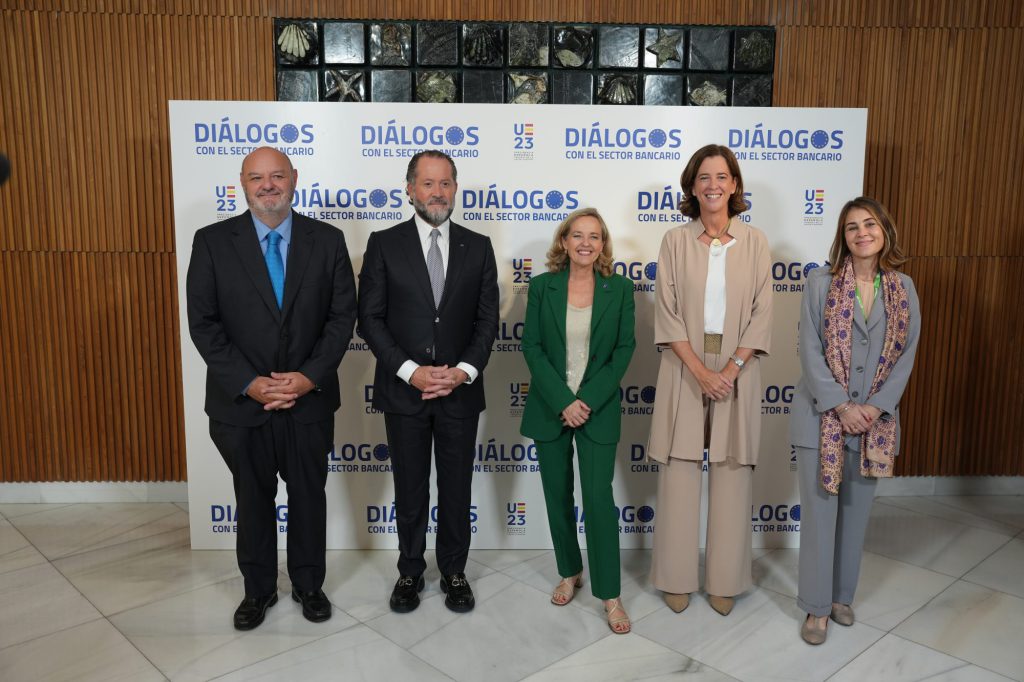The event 'Dialogues with the banking sector to promote economic and social progress' was held within the framework of the Spanish Presidency of the Council of the European Union and coinciding with the first meeting of the Ministers of the Economy and Finance of the European Union and Latin America.
The banking associations AEB, CECA and Unacc, in collaboration with the Spanish Presidency of the Council of the European Union and with the support of Abanca, have organised the event "Dialogues with the banking sector to promote economic and social progress", within the framework of the international and Latin American meetings being held in Santiago de Compostela.
The event, which was held at the Abanca Sociocultural Centre in Santiago de Compostela and inaugurated by the Chairman of Abanca, Juan Carlos Escotet, reflected on the present and future challenges facing the banking sector in relation to sustainability, digitalisation and financial education, the central themes of the discussion panels that followed.
To this end, senior officials from the Ministry of Economic Affairs and Digital Transformation, the Treasury, the Bank of Spain, the Xunta de Galicia, and Latin American institutions have taken part. Representatives from the banking associations AEB, CECA and Unacc, and of their member entities, also took part in the event.
During the inauguration of the event, the President of the Xunta de Galicia, Alfonso Rueda, highlighted the opportunity provided by holding events such as these in Santiago, within the framework of the Spanish Presidency of the Council of the EU, for the promotion of Galicia at international level. In addition, he emphasised that "it is necessary to involve business and banks to advance economic progress, which leads to social progress".
During the panel "Banks as a lever for economic growth: domestic and international", CECA's CEO, José María Méndez, delved into the contributions of the banking sector to address the regulatory challenges during the Spanish Presidency and stressed that "banking generates a fourfold impact: financial and social inclusion, thanks to its capillarity, the payment of taxes, job creation and the revitalisation of the sustainable economy".
Subsequently, the sector discussed present and future challenges in the areas of sustainability, digitalisation and innovation, and social commitment and financial education. In this regard, the Secretary General of UNACC, Cristina Freijanes, addressed the challenge that the social commitment of the sector represents, how it will evolve in the future and that, in any case, "it must take into account the financial inclusion of all groups in society, faced with an unstoppable digitalisation process". She also believes that the banking sector will know how to address the challenges it faces because, "if there is one thing we have shown, it is that we are capable of adapting in a timely manner".
The last panel was moderated by the Chairwoman of the AEB, Alejandra Kindelán, who highlighted the role of banks as a conduit channelling savings to investment and how in this process "we accompany families, companies and countries". Given the challenges presented here today, Kindelán explained that "our sector will continue to deploy its investment, financing and growth capacity to promote economic and social development, both in the European Union and in Latin America".
The first Vice-President and Acting Minister for Economic Affairs and Digital Transformation, Nadia Calviño, closed the conference by advocating public-private collaboration on the path towards the green and digital transition, and indicated that the future towards a better society depends on all economic and social actors, including banks. "These conferences are a success and convey a message of commitment to dialogue, multilateralism, European and international institutions, in order to respond in a coordinated and solidary manner to the challenges we face".
The event brought together in Santiago de Compostela senior representatives from the main economic institutions and relevant banking entities, leading to an extensive discussion and helping to strengthen the commitment of the banking sector to the challenges facing the country, with a broad social perspective, especially with regard to the green and digital transition, as well as to the various regulatory issues that are currently on the table.









